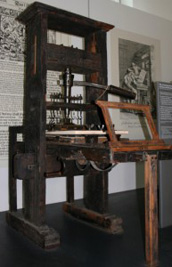Impressions
Akashic: Outside the Publishing Box
Amatoritsero Ede in Conversation with Johnny Temple
 Johnny Temple is the publisher and editor-in-chief of Akashic Books, an award-winning Brooklyn-based independent company dedicated to publishing urban literary fiction and political nonfiction. Temple won the American Association of Publishers' 2005 Miriam Bass Award for Creativity in Independent Publishing. Temple plays bass guitar in the band Girls Against Boys, which has toured extensively across the globe and released numerous albums on independent and major record companies. Temple has contributed articles and political essays to various publications, including The Nation, Publishers Weekly, AlterNet, Poets & Writers, and BookForum.
Johnny Temple is the publisher and editor-in-chief of Akashic Books, an award-winning Brooklyn-based independent company dedicated to publishing urban literary fiction and political nonfiction. Temple won the American Association of Publishers' 2005 Miriam Bass Award for Creativity in Independent Publishing. Temple plays bass guitar in the band Girls Against Boys, which has toured extensively across the globe and released numerous albums on independent and major record companies. Temple has contributed articles and political essays to various publications, including The Nation, Publishers Weekly, AlterNet, Poets & Writers, and BookForum.
Amatoritsero Ede: It is nice to have you on MTLS, Johnny. Akashic is a very dynamic small press in terms of its publishing, packaging, promotional and marketing activities. What was the philosophy behind its conception?
Johnny Temple: Thank you for your interest in Akashic! I have always thought of Akashic as the literary version of righteous independent record labels like Dischord Records from D.C. and Touch & Go Records from Chicago. These labels have put out phenomenal music over more than two decades, all the while valuing community over marketing.
A.E.: In how far can we say that the vigour of Akashic reflects your own commitment and vision as an artist?
J.T.: I definitely feel that being a book publisher is a creative endeavour in much the same way as being a musician.
A.E.: How did Akashic’s interesting “Noir” series begin? Can you tell us more about its inspiration, conception and the secret behind its huge success?
J.T.: The series began as a single volume, Brooklyn Noir, which was wildly successful and spawned this full series. The Noir Series aspires to offer profound and nuanced sketches of cities through anthologies of dark, stark fiction. If you can capture the true flavor of a city’s underbelly, then people who appreciate that city might respond. In addition to Brooklyn Noir, the series features Los Angeles Noir, Dublin Noir, Paris Noir, New Orleans Noir, and many other titles.
A.E.: What does ‘Noir’ mean? Like the word, ‘Akashic’, which has an esoteric/symbolic significance, what is the symbol implicit in ‘noir’, if any.
J.T.: There are hundreds of different definitions of the word “noir.” For the series, I define it broadly. These collections feature dark fiction with sinister moods and tones.
A.E.: Having worked in the publishing industry, I know the attention to detail and technical expertise it requires. How did you transition from a bassist in an indie Rock band to a seasoned publisher?
J.T.: I just jumped into publishing and sorted things out as I went along. I knew next to nothing about book publishing when we put out our first release, The Fuck-Up, the debut novel by New York writer Arthur Nersesian.
A.E.: Now to come to the focus of this conversation, printing is naturally central to Akashic’s operation as a brick and mortar publishing concern rather than a Publish on Demand electronic-based venture. Does Akashic have its own in-house printing department?
J.T.: Our books are printed by other companies. Our main printer is in Canada, but we also use printers in the U.S. and even one in Singapore.
A.E.: What guides your choice of print material and resources – paper for example, or the kind of printers to engage?
J.T.: We look for printers who offer high quality, with good production values . . . at a reasonable price.
A.E.: Binding is, of course, important to the life span of books as material objects. Does Akashic have a preference for a particular type of binding?
J.T.: The best way to bind a book is to have it sewn. However, Akashic can’t afford to have our books sewn. We are lucky to occasionally do so, but most of our books are perfect bound with glue (as are the vast majority of books out there).
A.E.: The book production process is complex. From text generation (probably necessary at the initial stages of the ‘noir’ series for example, where authors would have been directly commissioned) to editing, preparing galleys to corrections and actual press work and book release any number of things could go wrong. In all that how does Akashic maintain its signature high editorial and print quality?
J.T.: Neurosis gets a bad rap, but it’s actually quite useful.
A.E.: The book production process is only complete when the product is in the hand of the reader. Could you give us an insight into Akashic’s processes of dissemination?
J.T.: We distribute our books in many ways. You can find them in chain stores or independent stores, online, in museums and cafes, in the U.S., Canada, England, Europe, Jamaica, South Africa, Australia, and many other places. Our distributor in the U.S. and Canada is Consortium, a great company based in St. Paul, Minnesota.
A.E.: Does Akashic have reader-based sensitising initiatives? For example does social networking virtual spaces play a role in, reader-writer interaction, and dissemination generally?
J.T.: We’re active in social networking, but not in a very sophisticated way. It’s an area where we can improve what we do.
A.E.: Finally, how is Akashic different from the big publishers; what makes it unique amongst North American small presses?
J.T.: A few things make us different. We are aesthetically and culturally driven, not marketing driven. We have a strong focus on Caribbean authors, which sets us apart from most of the big publishers. We are author-friendly, and we work closely with our writers on all aspects of the book’s publication.


 Johnny Temple is the publisher and editor-in-chief of Akashic Books, an award-winning Brooklyn-based independent company dedicated to publishing urban literary fiction and political nonfiction. Temple won the American Association of Publishers' 2005 Miriam Bass Award for Creativity in Independent Publishing. Temple plays bass guitar in the band Girls Against Boys, which has toured extensively across the globe and released numerous albums on independent and major record companies. Temple has contributed articles and political essays to various publications, including The Nation, Publishers Weekly, AlterNet, Poets & Writers, and BookForum.
Johnny Temple is the publisher and editor-in-chief of Akashic Books, an award-winning Brooklyn-based independent company dedicated to publishing urban literary fiction and political nonfiction. Temple won the American Association of Publishers' 2005 Miriam Bass Award for Creativity in Independent Publishing. Temple plays bass guitar in the band Girls Against Boys, which has toured extensively across the globe and released numerous albums on independent and major record companies. Temple has contributed articles and political essays to various publications, including The Nation, Publishers Weekly, AlterNet, Poets & Writers, and BookForum. 

